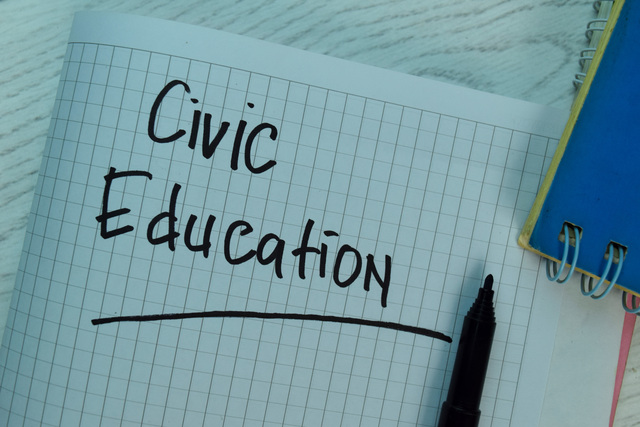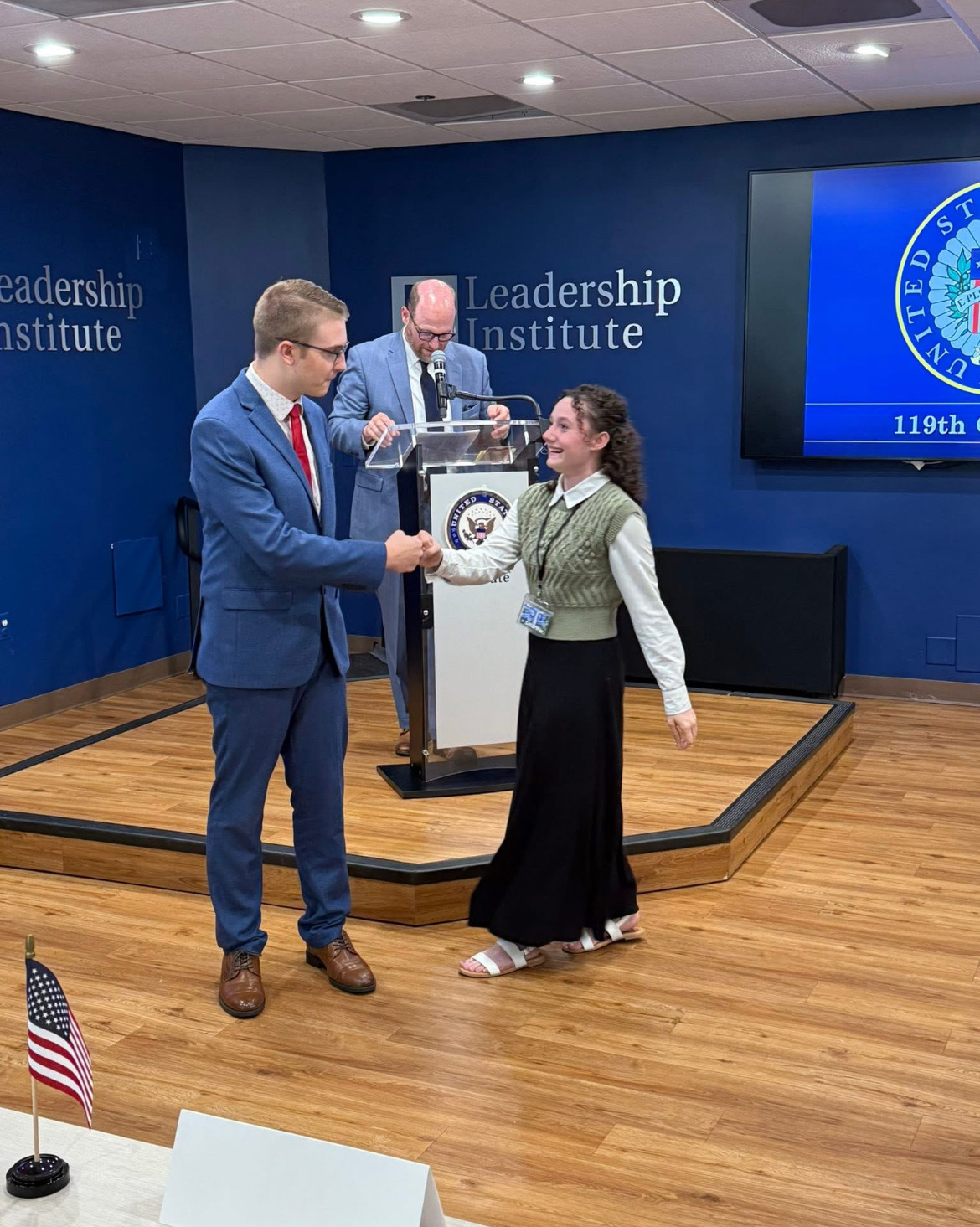Liberty's Lessons Start Here
Real civics isn't a performance. It's a preparation for liberty.

I spent nearly two decades in public education, including time as a classroom teacher, district leader, and later, as a director at the Florida Department of Education, where I helped implement Governor DeSantis’ Executive Orders on civics and government reforms. I’ve seen the system from the inside, and I know what it gets right—and what it’s getting wrong.
It’s easy to get caught up in the day-to-day grind and forget your “why.” That phrase may be overused, especially in education circles, but the truth is we all need a north star. Our “why” keeps us from drifting into motions without meaning.
When I worked at the Florida Department of Education, hiring new coaches for our team was one of those moments that made me pause and reflect on my own why and discover whether others shared it. I would ask a question that could have been answered with a laundry list of personal accolades: “I created this excellent lesson plan,” “I won that teaching award.” But I was looking for something different. I wanted to hear “kids.”
So, people often ask why I homeschool, and the answer is simple: I want the best education possible for my child. Now my days are spent defending our rights as parents to decide what our children’s education will be, pressuring public schools to do better for all children, and above all, prioritizing my most treasured work, given to me by God, educating my son.
That’s the same reason more than 25,000 families like ours in West Virginia have chosen to educate their children at home. We aren’t running from education—we’re reclaiming it.
That’s why a recent article from HisGoodNews.tv caught my attention. In it, two graduates of Grace Christian School, Carson and Rachel, shared how their school shaped them as leaders. Their reflections reminded me just how powerful a well-formed civic education can be, especially when it’s rooted in faith, virtue, and truth. The American Association of Christian Schools deserves credit for the role it’s playing in West Virginia, forming students not just for college or careers, but for citizenship.
Whether your child is in a Christian school, a public school, or a homeschool, one truth remains: parents are responsible for more than just making sure our kids know what happened in history; we’re responsible for helping them understand why it happened. That’s the heart of civic education—not just learning the past, but understanding your patriotic duty, knowing your rights and responsibilities as a citizen, recognizing when they’re under threat, and being prepared to defend them.
But too often, our schools have lost sight of that purpose. Instead of equipping students with the knowledge and virtue needed to sustain a free society, civics has been reduced to memorizing facts and dates, or worse, replaced with activism disguised as education. The result is a generation that may know how to protest, but not how their government works. They may feel strongly about justice, but lack the civic framework to pursue it within our constitutional system.

West Virginia is having a long-overdue conversation about civic education. Unfortunately, some would rather politicize that conversation than improve it.
Recent criticism of the new Center for Civics, Culture, and Statesmanship claims that efforts to strengthen civics instruction are “cherry-picking” the Constitution. But here’s the irony: it is the critics who are cherry-picking, skipping over the Bill of Rights entirely, and jumping straight to the Civil War-era amendments as if American constitutional history only begins with protest.
That approach ignores the foundational structure that made progress possible in the first place. The Declaration of Independence, the Constitution, and the Bill of Rights are not relics. They are the reason we could fight a winning battle for the amendments that came after. They laid down the logic of liberty and gave us the tools to pursue “a more perfect union.” Without those first principles (natural rights, limited government, checks and balances), there would have been no coherent framework within which to claim equality, liberty, or justice at all.
The real story of the Constitution is not one of static perfection or frozen ideals. It is a story of promise and progress, of a republic with enough moral clarity to declare rights, and enough political structure to make them enforceable. The amendments did not break from the Founding; they fulfilled it.
Yet today’s standards often skip that story entirely. In my review of West Virginia’s social studies curriculum, I found that students are asked to simulate court proceedings before they study the Bill of Rights. They are taught to “take civic action” before they’ve even learned what rights they possess or how laws are made. They’re given slogans without structure. And the result is a generation that sees protest as the only form of participation, and grievance as the only civic virtue.
Civic education should teach how our government works, why it was built that way, and how citizens are called to preserve it. That includes an honest study of our failures, but also a deep respect for the system that allowed us to correct them. That’s not cherry-picking. That’s coherence.
It also requires understanding what made the American experiment uniquely capable of protecting liberty, especially compared to the totalitarian regimes some critics now invoke. Repressive governments like Stalin’s Soviet Union or Mao’s China didn’t just censor comedians and jail dissidents; they did so despite having constitutions that, on paper, guaranteed free speech.
The Soviet Constitution, for example, included a formal right to express opinions. What it lacked was what James Madison called a “compound republic”: a constitutional structure in which power is intentionally divided between national and state governments, and further separated among branches, so that no single entity can dominate. In those regimes, rights existed in theory, but there was no framework to enforce them, no checks to prevent abuse, and no people-anchored system to demand accountability. That’s the difference our students must understand. Rights without structure are just promises. It’s the design of the American system, not just its ideals, that makes liberty durable.
If students had been taught the philosophical foundations of free speech and the structural design that protects it, we might have avoided some of the civic confusion of the past decade. When citizens don’t understand the difference between persuasion and coercion, or between personal belief and compelled expression, it’s easy to slide into dangerous territory. Debates over speech, identity, and public compliance aren’t just cultural clashes. They’re constitutional questions. And our students deserve to know what’s at stake, not just emotionally, but civically.
A real civics curriculum doesn’t pit the Founding against the amendments. It shows how they work together. It doesn’t treat the Constitution like a museum piece or a political cudgel. It teaches students to read it, reason with it, and defend it.
We need to teach the next generation how liberty works and how to keep it. That starts with a civics education grounded in substance. It means giving students a clear, coherent understanding of the Constitution from the beginning: the philosophical roots of our system, the structure that limits power, the Bill of Rights that protects individual freedom, and the amendments that reflect our ongoing effort to form a more perfect union.
This is why West Virginia must overhaul its civics standards. The current ones are fragmented, shallow, and misaligned with the very goals of civic education. A strong civics curriculum isn’t nostalgic or partisan. It’s foundational. It’s the most effective, lasting way to equip students with the knowledge, judgment, and character required to preserve the republic they will one day inherit.
West Virginia Christian Education Association empowers students in their schools to learn about civics first hand. Carson and Rachel told us about not only learning the “what” but the “why”. To quote them: “At the very minimum, I am involved in politics in the way that I am a voter and a citizen, and I must decide if I am going to be an informed voter or an ignorant one.”
Every West Virginia student deserves a curriculum that transforms this idea into a reality.

Tiffany Hoben
Tiffany is the Director of Education Partnerships and Strategy for the Cardinal Institute. She brings in-depth knowledge of Civics and Government, along with possessing expertise in instructional materials review and state policy implementation. In addition to her contributions to education, Tiffany proudly served in the Army with the Florida National Guard as a Combat Field Medic, demonstrating her commitment to service and leadership.















